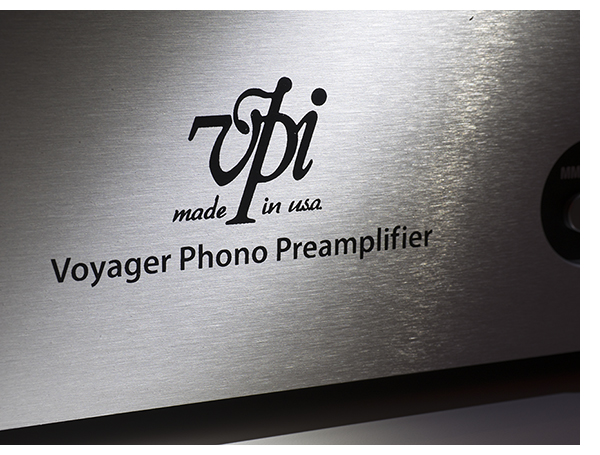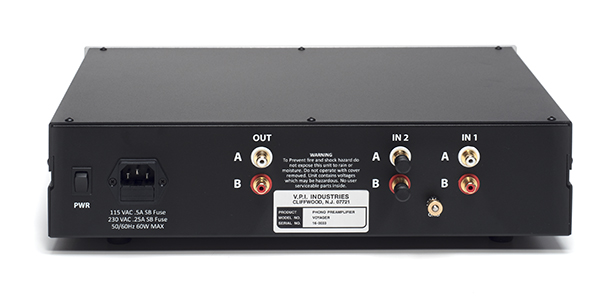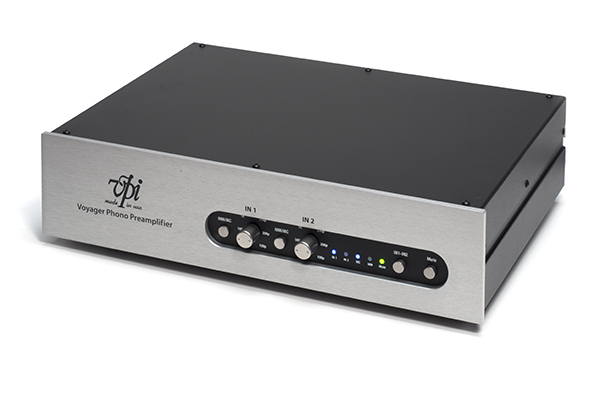World’s First Review: VPI’s Voyager

About a year and a half, on a visit to the VPI factory, Mike Bettinger had just joined the staff and was hard at work on what would become the Voyager phonostage.
A true old-school perfectionist, Bettinger probably drove VPI principal Mat Weisfeld crazy fine tuning the finished product. Company owners want to sell stuff and engineers keep wanting to refine things; it’s probably been that way since the caveman days when they first started carving wheels out of stone. Yet even what I heard then was incredibly good.
Everybody wants some
Resisting the urge to put this in a really fancy box and charging crazy money, VPI is offering the Voyager for $2,500. This is an interesting price point, because there are a number of high performance/high value phonostages around $1,000 and up beyond $5,000 to about $10,000. But there aren’t a ton of offerings in this price range. The only product that gives the Voyager a run for its money is the Musical Fidelity NuVista (also in this issue) at $2,999. And even at that rate, we’re talking different instead of strictly better. But that’s another review for another day.
No offense to VPI turntable owners, but I love the Classic 1. VPI makes some of the best performing tables in their respective price points, but the Classic 1 is my favorite $3,000 turntable because like the good doctor in Star Trek: Voyager, it performs way beyond its original programming. There are a lot of decent turntables for the same price as the Classic, but none offer a level of engagement, musicality, and synergy (I’d call it magic) that this table does. It’s like jumping out of a BMW M5 and getting into a Golf GTi. Yeah the $120k Bimmer is better, but the $30k VW is so damn good, and so damn fun, after about 10 miles you not only don’t notice the difference, but you’re having such a great time you find yourself not even missing the big bucks ride anymore. The Voyager offers the same experience.
Could this be magic?
From the second the stylus was dropped on the surface of the recent MoFi Santana Abraxas, the magic light went off on the dashboard inside my head. I didn’t feel like I was listening to a great $2,500 phonostage, I felt like I was listening to a great phonostage period. I’m not going to put my CJ TEA-1 on Audiogon tomorrow, but it might be a while before I plug it back in.
Trying to objectify the Voyager better than just saying it’s “magic,” the first thing you’ll experience is major low frequency grunt, with an equal helping of low frequency definition. The grungy, distorted bass line in Ani DiFranco’s “Sasquatch” sets you back in the listnening chair Maxell man style. In addition to my own Classic One, the AVID Volvere SP with Rega RB2000 arm and the new Technics SL1200G turntables were used, with a wide range of cartridges from the $70 Shure M44 all the way up to the $10,000 Koetsu Jade Platinum. All were an excellent match.
Engaging as the Voyager is out of the box, cold, it stabilizes in about 24 hours, delivering an even warmer, smoother, more delicate sound. There’s not a hint of solid-state glare anywhere. With no massive Teflon coupling caps inside the box, it won’t take 600 hours to sound right and that’s awesome.
The fit, finish, and feature set put the Voyager over the top. As someone said elsewhere, “it has everything you need and nothing you don’t.” Vinyl malcontents will complain (as they always do) that the Voyager could use a wider range of gain and loading options, or balanced inputs/outputs. Shut up. This phonostage reveals so much music, that stuff would have just jacked up the price. There are plenty of cartridges that work with 100, 500 and 1000 ohms.
Oh yeah, Voyager doesn’t give you a MM and a MC input, it gives you two inputs, with either configurable as MM or MC. A number of $10k phonostages don’t do that. Even better, all the gain, loading and MM capacitance settings are accessible from the front panel. Additional coolness. Note: you must hit the mute button before making said changes, or grungy, potentially tweeter damaging stuff will come out. Don’t say I didn’t warn you.
Eruption
Enjoyable as using the Voyager with a range of premium MC carts, I wasn’t prepared for the unexpected. Mounting up a budget Shure M44 MM cartridge ($70 from our buds at Needle Doctor) on the Technics SL1200G to perfection with Richard Mak’s Analog Magik software suite seemed a bit overkill at first,but pulling a 12-inch single of George Michael’s “I Want Your Sex” is incredible, with the massive bottom end described earlier in this review, and a sheer velocity and punch that has to be experienced. An equally exciting but slightly mellower rendition was offered with my Classic One.
Is this musical reproduction at its finest? Probably not. Just as a famous cheesesteak at Philly’s Gino’s isn’t haute cuisine, I’d rather eat a cheese steak than steak tartar. If that’s you, consider grabbing an M44 for your table to mate up with the Voyager – that extra input is just begging for a 1200 and a DJ cartridge.
Fun and dynamic as the Voyager is, it offers high performance across the spectrum. With 62 db of gain, it will accommodate nearly all MC cartridges that you might want to mate with it. It’s low end punch will grab you, but closer inspection reveals a balanced frequency range throughout, and a delicate, nuanced high end as well. And the tonal balance presented is as close to perfectly neutral that you’ll find this side of a Boulder. It neither adds nor subtracts tonally, which makes it such a great match for whatever you might want to install in your headshell. Want a warmer presentation? Go for a Grado or Koetsu. Want more neutral? Think about Lyra, Ortofon, or something in that vein. Truly, the only thing that’s somewhat off limits are the handful of cartridges with incredibly low output in the .2mv range. Again, there’s plenty of choices in the .4 – .6mv range, so stop making excuses.
Best of both worlds
Everyone has their own set of hot buttons. I will always sacrifice functionality for performance if I have to choose. I’d much rather have basic, well thought out functionality and awesome performance than the other way around. VPI’s Voyager is off the chart good. And, you’ll never have to hunt for tubes, or drive yourself crazy hunting down NOS tubes at ridiculous prices. Plug it in, turn it on and dive into yummy analog goodness. Make that greatness.
This is the easiest Exceptional Value Award I’ve ever awarded. Buy a VPI Voyager before Mat and company put this in a pretty box and start charging $6,000 for it. -Jeff Dorgay
$2,500
Peripherals
Turntables VPI Classic One, AVID Volvere SP, Technics SP1200G
Cartridges Shure M44, Ortofon 2M Bronze, Grado Statement, Hana SL, Koetsu Jade Platinum
Amplifier Pass INT-60
Speakers Raidho X-1 w/2-REL T7i subwoofers
Cable Cardas Clear
Power PS Audio P20





